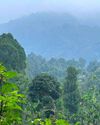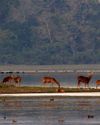
What is a Mangrove actually? It is a small tree or shrub that grows along coastlines, taking root in salty sediments, often underwater. The word 'mangrove' might refer to the habitat as a whole or to the trees and shrubs in the mangrove swamp. Mangroves are flowering trees, belonging to the families Rhizophoraceae, Acanthaceae, Lythraceae, Combretaceae, and Arecaceae.
The underground tissue of any plant needs oxygen for respiration. However, in a mangrove environment, the oxygen in the soil is limited or nil. Hence the mangrove root system absorbs oxygen from the atmosphere.
Mangroves have special roots for this purpose called breathing roots or 'Pneumatophores. These roots have numerous pores through which oxygen enters the underground tissues. With their roots submerged in water, mangrove trees thrive in hot, muddy, salty conditions that would quickly kill most plants.
Mangroves, like desert plants, store fresh water in thick succulent leaves. A waxy coating on the leaves seals in the water and minimises evaporation.
The seeds germinate while still attached to the parent tree. Once germinated, the seedling grows into a propagule. The mature propagule then drops into the water and gets transported to a different spot, eventually taking root in solid ground. Typically, they are found only along sheltered coastlines within tropical or subtropical latitudes because they cannot withstand freezing temperatures. They share the unique capability of growing within reach of the tides in salty soil.
Apart from Sundarbans in West Bengal, Mangroves are also present in Gujarat and Andaman Nicobar Islands.
West Bengal has the highest percentage of area under total Mangrove cover followed by Gujarat and Andaman Nicobar Islands.
This story is from the April - May 2023 edition of Travellers' World.
Start your 7-day Magzter GOLD free trial to access thousands of curated premium stories, and 9,000+ magazines and newspapers.
Already a subscriber ? Sign In
This story is from the April - May 2023 edition of Travellers' World.
Start your 7-day Magzter GOLD free trial to access thousands of curated premium stories, and 9,000+ magazines and newspapers.
Already a subscriber? Sign In

National Parks Of India
India is blessed with a rich tapestry of biodiversity that is both a natural heritage and a national treasure. The concept of national parks in the country traces back to the late 19th century when the importance of conserving wildlife began to take root in the consciousness of the colonial administration. The first national park in India, Hailey National Park (now known as Rajaji National Park), was established in 1936, marking a historic commitment to wildlife conservation. The post-independence era saw an exponential increase in protected areas, primarily driven by a need to conserve India’s unique flora and fauna threatened by rampant industrialization and urbanization.

10 Fascinating Wildlife Sanctuaries
TO EXPLORE THE WILD SIDE OF INDIA

Conversation with the "BOOK MARKETING GIRL"
In an age where digital advancements and artificial intelligence often overshadow traditional practices, two visionaries have chosen a different path.

FARM AAVJOSAA - HER STORY
“Riddhi was a whirlwind of energy, unable to endure even a minute apart from her twin, Siddhi.

FOOD MEETS FANTASY IN CROATIA
As the sun dipped below the horizon, casting a warm golden glow over the rolling hills of Croatia, Foodpreneur Debaditya Chaudhury found himself on a gastronomic adventure that promised to tantalize his taste buds and inspire his culinary creativity.

THE UNTAMED BEAUTY OF SATPURA TIGER RESERVE
In Conversation with L. Krishna Moorthy, The Field Director of Satpura Tiger Reserve

SUNDARBANS THROUGH THE DECADES
As Witnessed By Anil Mistry, The Swamp Tiger Rescuer

LOOK EAST - WILDLIFE AND TOURISM IN THE NORTHEAST OF INDIA.
The North East of India is an ecological and biodiversity hotspot. Diverse habitats and ecosystems - each with its own species of birds, animals and plants – make this region home to an abundance of flora and fauna.

KAZIRANGA NATIONAL PARK AND TIGER RESERVE
There is a mad frenzy for travelling in recent times. Everywhere you look, read, or hear, people travel worldwide, domestic, offbeat travel has become a trend.

CORBETT NATIONAL PARK: A Legacy of Conservation and Biodiversity
From the moment I set foot in the enchanting and tranquil realm of Corbett National Park, a deep connection was forged in my heart.